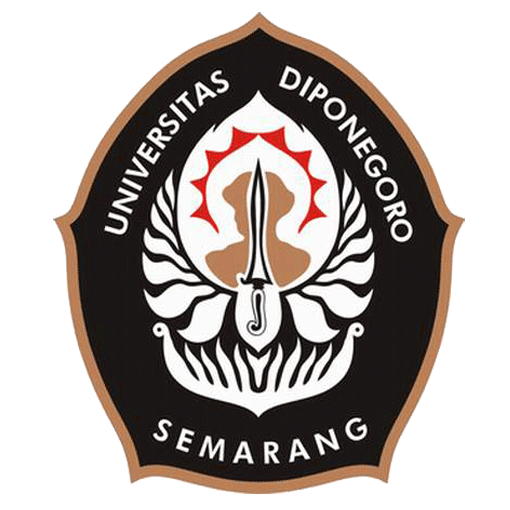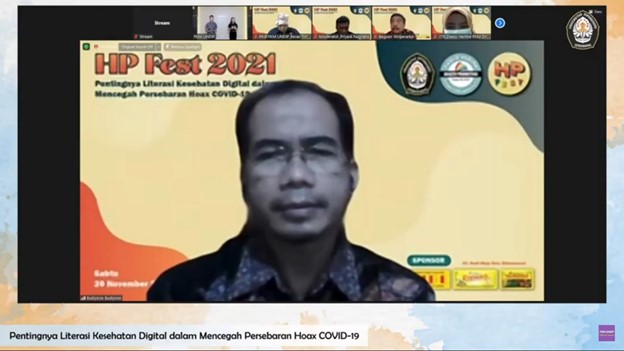SEMARANG – The Faculty of Public Health of Diponegoro University invited the entire academic community to support the handling of Covid-19 through the health literacy movement in the digital space. Health literacy in the digital space needs to be encouraged to prevent the circulation of hoaxes that interfere with the handling of Covid-19 by the emergence of misleading issues.
One of the issues that interfere with the Covid-19 handling program is the dangers of vaccines that makes some people hesitate to vaccinate. Those are the points that appeared in the webinar entitled “The Importance of Digital Health Literacy in Preventing the Spread of the Covid-19 Hoaxes”, which was held by Faculty of Public Health Undip recently and was attended by around 600 participants. The webinar presented two speakers, a literacy activist who is also a lecturer at Sebelas Maret University (UNS), Retno Tanding Suryandari, S.E., M.E., Ph.D.; and researcher from Center for Health Economics & Policy Innovation of Imperial College London, Dr. Dian Kusuma, S.KM, M.PH.
Head of the Health Promotion and Behavioral Sciences Section of Faculty of Public Health Undip, Dr. Drs. Syamsulhuda Budi Musthofa, M.Kes, when giving a speech said that the implementation of this webinar is one of a series of events from the Health Promotion (HP) Fest 2021. Syamsulhuda hoped that this activity could be part of efforts to educate the public, especially observers of health issues.
According to him, in the midst of the Covid-19 pandemic, news and information from various media took turns. The information obtained can be something that is difficult to understand properly, whether it has the value of correct or incorrect information so that it becomes a challenge for health promoters and health care workers to follow up the truth.
“That’s why we held this webinar with the theme of the importance of digital health literacy in preventing the spread of Covid-19 hoaxes in the hope of providing enlightenment and education for participants, especially observers of health issues,” he said.
Dean of Faculty of Public Health Undip, Dr. Budiyono, S.KM., M.Kes. added that this webinar is important to be held. According to him, hoaxes were already spread intensely before the pandemic, especially in current conditions with very easy access, many people can access from the media whose exposure is extraordinary so that the data submitted through the media needs to be sorted and selected. “We took this step to avoid noise and misinterpretation. Not only now but also for the future,” said Budiyono.
Meanwhile, in delivering material on digital health literacy, Dr. Dian Kusuma S.KM, M.PH, said that in April 2020, Thomas Abel and David McQueen from the University of Bern published an article about the importance of health literacy in the midst of Covid-19 outbreak.
They said that the public would find it difficult to understand what experts or politicians had to say. Moreover, at the beginning of the pandemic, there was a lot of uncertainty about knowledge of Covid-19 because the news changed all the time. He stressed the need for firm and clear communication to the public. Since whatever the leaders or experts say, that is what people try to understand.
Meanwhile, in digital health literacy, even by adding one word “digital” makes health literacy more complicated. This is because its implementation requires several additional factors such as computer literacy, media literacy, traditional literacy, information literacy, and scientific literacy. “So there are many things from a personal perspective that affect digital health literacy, including age, state of health, and educational background. It should also be noted that, the beginning of health literacy is understanding the available information, and it ends in making personal actions,” he said.
Meanwhile, Retno Tanding Suryandari, S.E., M.E., Ph.D. said that fake news or hoaxes had increased in the midst of the Covid-19 pandemic. Mafindo has recorded that there were 2298 hoaxes that appeared in 2020. A total of 788 or 34.3% of them were hoaxes about Covid-19. Meanwhile, in 2021, the ratio decreased from 2298 to 1044 new hoaxes. However, around 25% of the news contain hoaxes about Covid-19.
In the world of communication, she explained that there are several kinds of information, including misinformation, disinformation, and malinformation. Misinformation is false information, but the person who spreads it believes that it is true. While disinformation is when misinformation is spread intentionally by people who know that this information is false. “So there is an element of intent here,” she said.
According to her, hoaxes fall into the category of disinformation. And the last is malinformation, which means that there is a basis for truth, but it is intentionally used to harm other people, organizations, or countries. Furthermore, internet access that makes humans enter a new era is one of the triggers for easy hoaxes to develop. Before entering the era of the internet, news could only be accessed through TV, radio and newspapers and the public were only connoisseurs. “It is different from the current situation when the internet has emerged and has become a part of our lives,” she said.
With the existence of social media, it is possible for someone not only to become a connoisseur, reader, or listener but also a news maker and news spreader. “From this point, hoaxes can emerge and spread. Sometimes our fingers are faster than what we think,” she said at the event which was held on Saturday (11/20/2021).
A phenomenon that often occurs is that people share information without carefully understanding whether it is verified as true or not. Therefore, it is important to understand today’s digital health literacy in the midst of the rapid flow of information. According to her, there are several reasons that cause hoaxes to spread easily, such as the form of public participation, seeking recognition or existence, getting profit, as well as forms of provocation and propaganda. (PR team)

